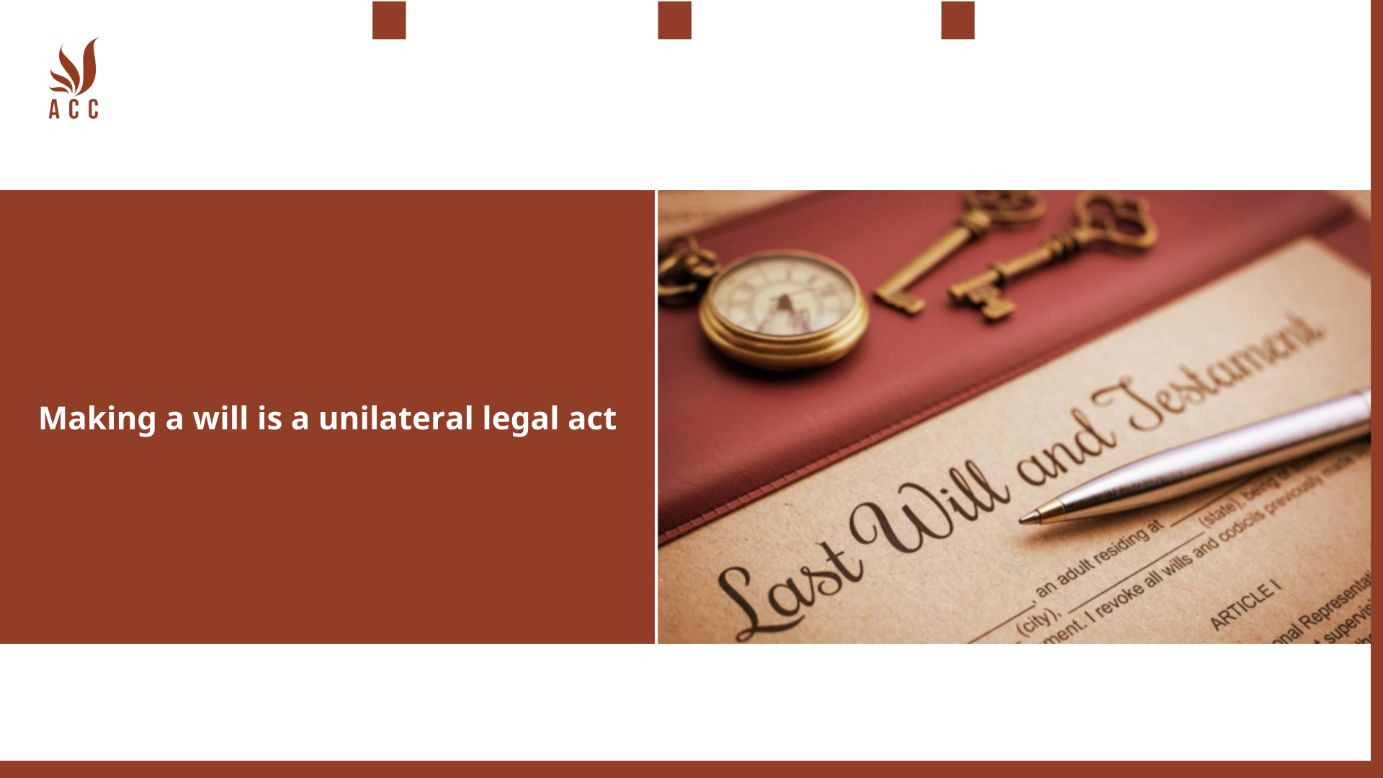Making a will is generally considered a unilateral legal act. A unilateral legal act is an action or declaration made by one party without requiring the consent or involvement of other parties. In the context of creating a will, the testator (the person making the will) is the sole party responsible for making decisions about the distribution of their assets and the appointment of executors, guardians, or beneficiaries. Here are some key characteristics of making a will as a unilateral legal act:
1. Individual Decision-Making:
The testator has the sole authority to decide how their property and assets will be distributed upon their death. They are not required to obtain consent or approval from others, although they may consider the interests and needs of their beneficiaries.

2. No Required Agreement:
Unlike contracts or agreements, making a will does not involve negotiations or agreements between parties. It is a unilateral declaration of the testator's intentions.
3. Freedom to Choose:
The testator has the freedom to choose the beneficiaries, specify the distribution of assets, and name executors or trustees in their will according to their own preferences and objectives.
4. Revocability:
The testator retains the right to amend, revoke, or replace the will at any time as long as they have the mental capacity to do so. This reflects the unilateral nature of the decision-making process.
5. Legal Formalities:
While the decision to create a will is unilateral, there are legal formalities and requirements that must be followed to ensure the will's validity. These may include witnessing, signing, and notarization, depending on local laws.
6. No Requirement for Beneficiary Consent:
Beneficiaries named in the will are not required to consent to their inheritance. The testator's decisions are binding, provided they comply with legal requirements.
7. When using ACC Law Firm's testament, entrepreneurs will receive
When using ACC Law Firm's testament, entrepreneurs will receive professional legal advice and assistance in drafting a comprehensive and legally binding will that reflects their specific business needs and objectives. The testament will ensure the smooth transition of their business assets and help protect their interests and those of their beneficiaries. Additionally, entrepreneurs will have access to ongoing support and guidance from experienced attorneys who specialize in estate planning for entrepreneurs.
8. Q&A
Q1: What does it mean that making a will is a unilateral legal act?
A1: When it is said that making a will is a unilateral legal act, it means that creating a will is a personal and one-sided decision made by the testator (the person making the will). The testator has the autonomy to determine how their assets and properties will be distributed after their death without the need for consent or agreement from others.
Q2: What are the key characteristics of a unilateral legal act in the context of making a will?
A2: The key characteristics of a unilateral legal act in making a will include:
-
Independence: The testator has the freedom to express their wishes regarding asset distribution without external influence or coercion.
-
One-Sided: The decision to create a will is made solely by the testator, and the beneficiaries do not need to consent or agree to the terms.
-
Binding: Once a valid will is created, it becomes a legally binding document, and the testator's wishes must be respected after their death.
Q3: Can the testator's decisions in a will be contested or altered by beneficiaries or heirs?
A3: The decisions made by the testator in a will can be contested or altered under certain circumstances. Beneficiaries or heirs may challenge the will if they believe it was created under duress, fraud, undue influence, or if there are concerns about the testator's mental capacity. Legal proceedings may be initiated to contest the will, and a court may decide whether to uphold or alter the distribution based on the evidence presented.
Q4: What is the significance of understanding that making a will is a unilateral legal act?
A4: Understanding that making a will is a unilateral legal act underscores the importance of respecting the testator's autonomy and intentions. It highlights the testator's right to make decisions about the distribution of their assets without external interference. It also emphasizes the legal validity and enforceability of the will, provided it meets the necessary legal requirements. However, it's essential to ensure that the testator's decisions are made freely and without any undue pressure or manipulation to maintain the integrity of the will.
Nội dung bài viết:






Bình luận